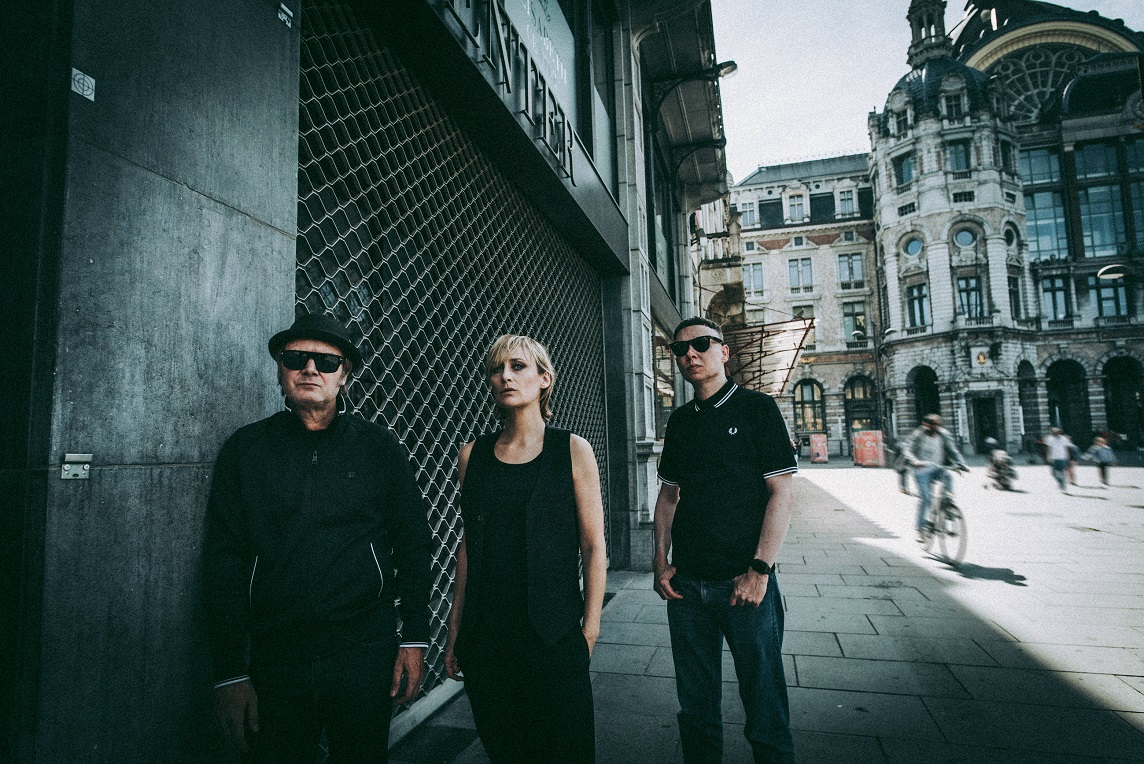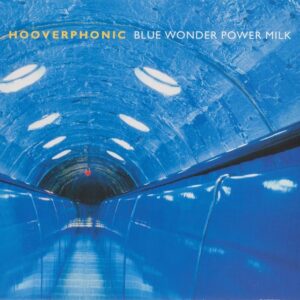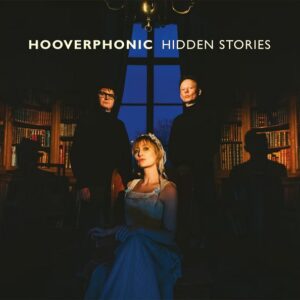After nearly three decades of pop success, Hooverphonic have seen their global fan base grow from Anchorage to Ankara, but the band remains reassuringly Belgian.
There’s no better proof of that than the Magritte-style flight safety film the trio recently made for Brussels Airlines – you’ll see it on the carrier's fleet for the next three years – and the instantly recognisable locations in Schaerbeek, which feature in the video for their last single, Mysterious.
The group’s unashamed Belgitude, as well as their close ties with Brussels, have been evident since their earliest days.
Their driving force is band founder and songwriter Alex Callier. He has invited me to his state-of-the-art home studio, adjoining his custom-designed house in his hometown Sint-Niklaas, to chat about the group’s journey, his musical inspirations, life after 50, and, in an exclusive preview, to listen to the tracks that will form the band’s next album, due for release later this year.
Nattily dressed in straight-leg jeans, trendy boots, shirt and expensive-looking wool cardigan, bespectacled Callier leads me into his “office”. Everything is immaculately clean and green, from the carpeted floor to the felt-covered walls – even his cardigan matches the colour scheme. He nonchalantly beckons me into a womb-like, darkened room, dominated by recording consoles and a giant computer screen with Pro Tools software, a must for any self-respecting working musician.
There’s a small kitchen off the suite, where he makes me tea. We plant ourselves at either end of a sofa – it’s green, naturally – opposite his editing screen.
Callier studied at the Royal Institute for Theatre, Cinema and Sound (RITCS) in the capital’s rue Dansaert and, after graduating, worked for three years as a sound technician at VRT – the same broadcaster which would later help select Hooverphonic as Belgium’s entry for the 2021 Eurovision Song Contest in Rotterdam. In a rare setback, they finished a disappointing 17th out of 26 with the prophetically titled song, The Wrong Place.
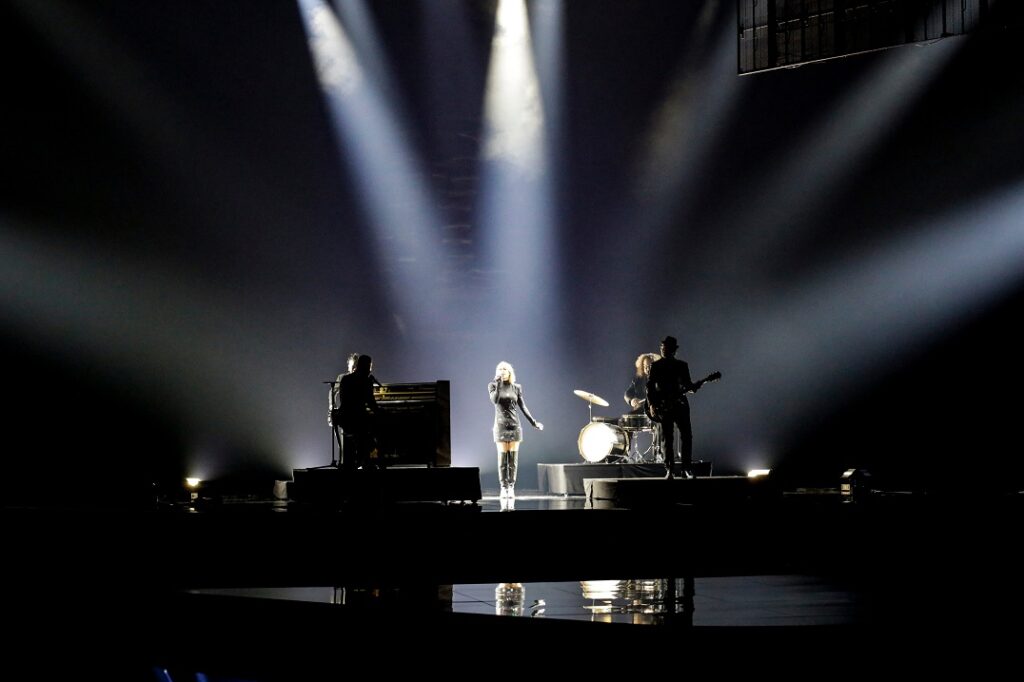
Hooverphonic at the 2021 Eurovision Song Contest in Rotterdam
A bass guitarist, Callier created the band in 1995 with fellow film school and VRT alumnus Frank Duchêne on keyboards, pal Raymond Geerts on lead guitar and Esther Lybeert, the first in a revolving cast of female singers of whom Geike Arnaert, now in her second spell, is the longest serving incumbent and voice behind most of their biggest hits. “When we’re recording, Geike sits exactly where you are, with a hand-held mike,” says Callier, pointing at my end of the sofa.
Car park reverb
The band might never have started but for a chance discovery in the VRT car park in Brussels: lying in the rain were two giant plate reverbs, used for sound effects. “VRT said I could have them, so I called a mate with a van and took them home,” Callier recalls. “They created a lot of feedback so I couldn’t use them in my apartment. I called Galaxy Studios in Mol and asked if they wanted them. They gave me €5,000! That money meant I could buy new synths and equipment, which we used to record our first album.”
Lybeert, still at school, quit the band just before they signed their first contract with Sony Belgium and was replaced by Liesje Sadonius on their aptly-named 1996 trip-hop debut, A New Stereophonic Sound Spectacular. Released under the moniker of Hoover, the group added phonic to their name after discovering it was already in use by two other groups, not to mention a potentially litigious vacuum cleaner company.
The album received a significant pre-release boost when one of its standout tracks, 2Wicky, was included on the soundtrack of Bernardo Bertolucci’s controversial movie, Stealing Beauty. Hooverphonic’s melancholic, cinematic pop has been in constant demand ever since for films, TV and commercials – a lucrative sideline for kingpin Callier, who writes almost all their material.
I’ve printed off some questions, but it’s immediately clear that we won’t get through many because chatterbox Callier barely stops to breathe. His manager had hinted as much when I requested a one-hour interview. “Take two hours. Alex is a passionate talker,” she said. We actually run to nearly three hours, although part of that is spent listening to the new album and unreleased material in what Callier calls his “song cellar”.
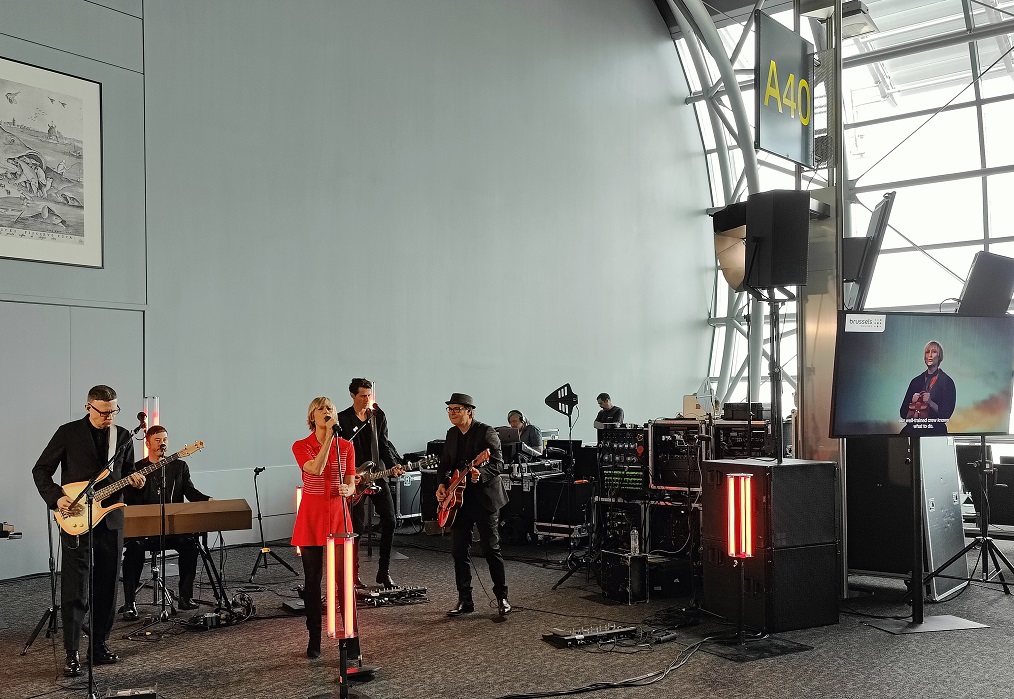
Hooverphonic performing in Brussels Airport
On stage, Callier projects a serious, Kraftwerk-like aura. In person, he’s engaging, articulate and justifiably proud of his band, which has, to date, released 11 studio albums, two live albums, three compilations and numerous singles, racking up multi-million sales worldwide.
He reveals that the as-yet-unnamed new album (The United States of Amnesia is under consideration as a title) will mark a return to the ambient style of Hooverphonic’s early output. “It's quite 90s, old school hip-hop inspired. We're going back to our roots – but not completely,” he says.
I like tech
The timing of its release is dictated by the major streaming platforms. When Hooverphonic formed, artists would typically issue an album and single together, then two or three more singles from the same collection. That no longer pays off, Callier explains. “Streaming services only support songs that are brand-new, which means we’ll release a couple of songs every month between February and September, when the album will come out if everything goes well,” he says.
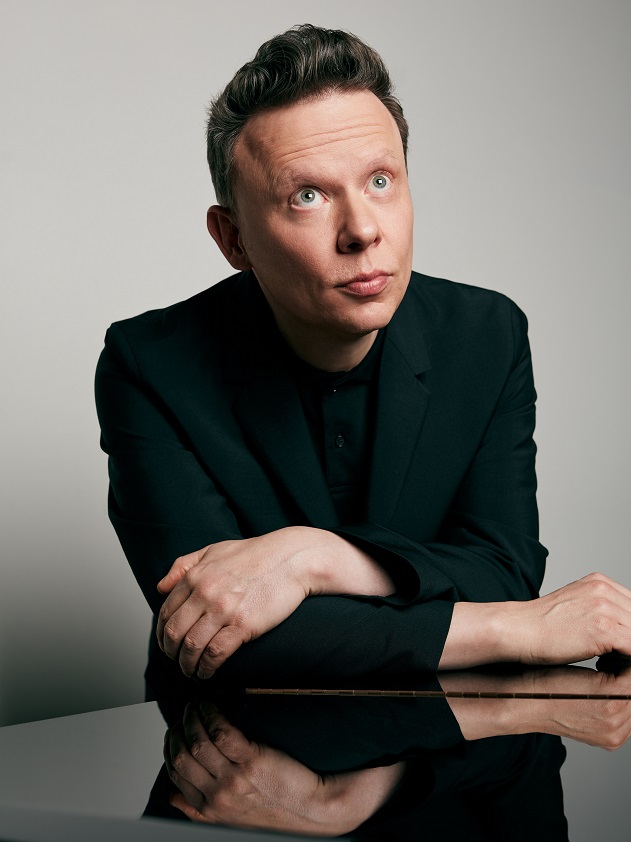
Callier
Artists now schedule releases much more frequently. “It's almost as if we're back in the 60s at the beginning of pop when bands would release lots of singles,” Callier says. “If they had five or six hits, they would compile them into an album. For our hardcore fans, it’s disappointing because they have to wait longer for the album. On the other hand, I like new technology. It doesn't bother me that it influences the way we release our records.”
Callier often listens to music on the platforms. He prefers the sound on Apple Music to Spotify – and plays me a track on both to demonstrate the difference. “There’s more top and bottom on Apple. Even my wife can hear the difference instantly,” he says. “But don’t tell Spotify.”
The platforms provide him with monthly reports detailing who’s currently listening to Hooverphonic. “They show our audience is split 50-50 between men and women and fairly evenly spread by age bracket. Nearly 30 percent of our fans are 18 to 27, with 22 percent from 28 to 34, 24 percent from 35 to 44, and then 21 percent from 35 to 59. Over-60s account for only five percent because they prefer vinyl and CDs. We see that broad age range at our concerts, too.”
The reports also show where Hooverphonic are most popular at any given time. “As of now, it’s Belgium, Turkey, the United States, France and Italy, followed by the Netherlands, Germany, UK, Mexico and Spain. In terms of cities, we’re currently getting most listens in Istanbul, Brussels, Paris, Ankara and Amsterdam,” he adds. He’s not sure why Hooverphonic are so big in Turkey but they perform there often, drawing audiences in the thousands.
Bowie, Gainsbourg, Brel
Hooverphonic’s songs achieved around 40 million streams worldwide last year, but this does not translate into huge financial rewards, says Callier. “Spotify pays €2,000 for a million streams. But the majority of the money goes to the record label. It's very difficult, especially for new artists, to make money on recordings. That's why everybody's always touring and, of course, that’s a problem because then you have too many artists on the road and not enough playing in clubs. We were lucky that we started in the 90s and have a strong back catalogue.”
However, that back catalogue will reap dividends when the rights to Hooverphonic’s early recordings start reverting to the band in eight years time. “That's going to be our pension,” he smiles.
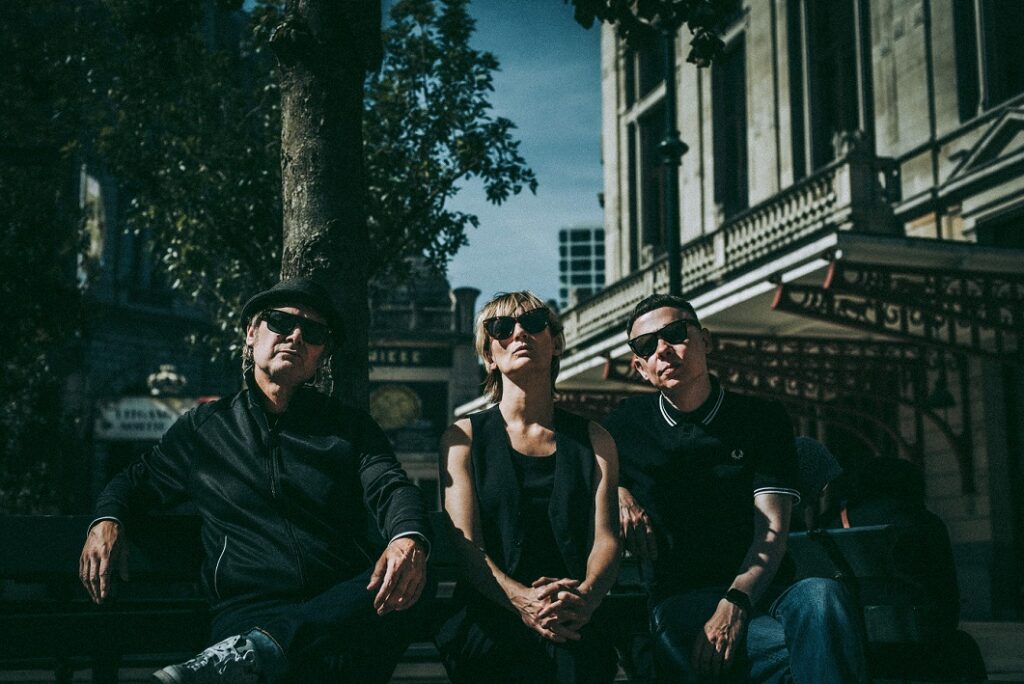
At Antwerp Zoo
It’s impossible to listen to Hooverphonic without spotting the influence of some of Callier’s heroes including Jacques Brel, Ennio Morricone and John Barry. But he says his biggest inspirations are David Bowie and Serge Gainsbourg. “They both started as chansonniers with little songs about daily stuff. I adore the first David Bowie record, which has songs like Sell Me a Coat and There Is A Happy Land. Gainsbourg wrote Le Poinçonneur des Lilas about a ticket collector on a tram. I love that period.”
The key for both, Callier says, is that their voices were distinctive and did not change even when their music changed. “The way I see it is that their voice is like a designer chair. A very particular chair, a very recognisable chair. And they were smart enough, with every album, to redecorate the room but to always put the same chair in there. They worked with different people on their records, like Nile Rodgers or Tony Visconti with Bowie or Arthur Greenslade with Gainsbourg, but the ‘chair’ was always there,” he says.
But for all his admiration of the Bowie and Gainsbourg way, Callier did not emulate them. “With Hooverphonic, we did the opposite. We kept the room and changed the chair by swapping singers. That works for us. It forces you to reinvent yourself because a new voice is also a new way of writing,” he says.
Callier and Cathy
Another key influence and muse is British singer-songwriter Cathy Dennis, an early 90s star who later co-wrote Toxic for Britney Spears and Can't Get You Out of My Head for Kylie Minogue. Callier confirms that Hooverphonic’s biggest hit, Mad About You, is about her.
“We first met at a songwriting camp in Britain, at a mansion near Huntsham, Devon. It was in the middle of nowhere,” recalls Callier. “EMI Publishing invited 50 writers from all over the world. On the first night, they organised a wine tasting. This Venetian blonde is standing next to me, complaining that the wine ‘tastes fishy’. I taste the wine. It’s perfectly OK. So we start arguing and continue the whole night. I didn't have a clue who she was. Even when someone told me, I’d never heard of her. The next morning, of course, I had to write with Cathy.”
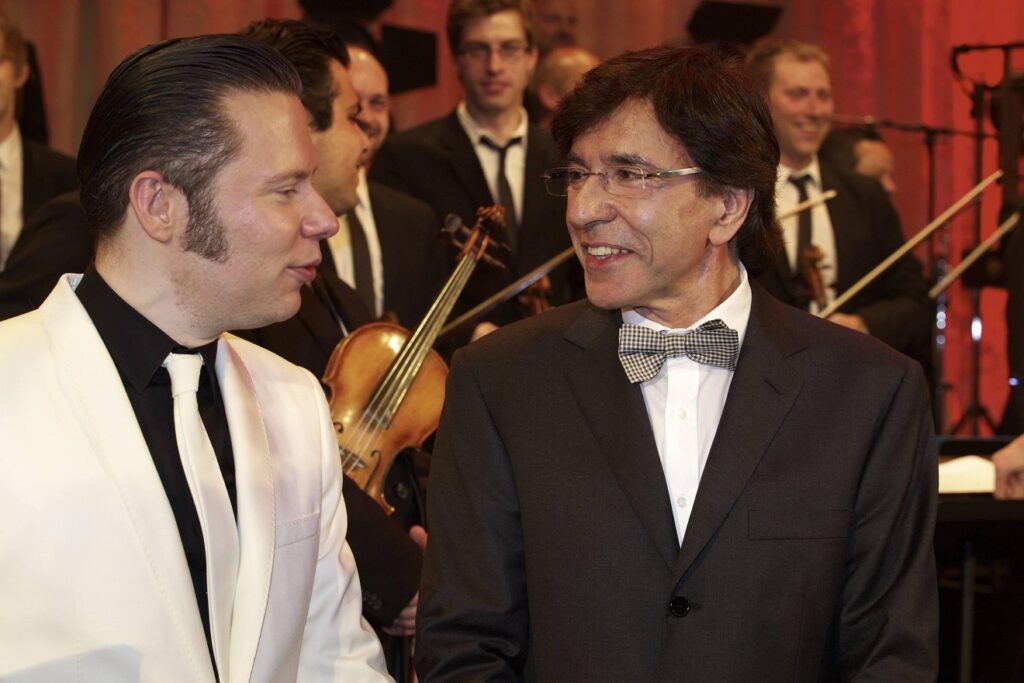
Callier meeting former Prime Minister Elio di Rupo
The very first lyric they wrote was “the last thing I need is you”, the title of one of Hooverphonic’s most popular songs. Cathy’s reference to “fishy wine” is in Mad About You, and the pair later wrote another fan favourite, Jackie Cane. “After that first day, we got along really well,” Callier says. “We were best friends. I learned a lot from Cathy. Her record collection was full of indie stuff like Elliott Smith, Laura Nyro and Jason Falkner, but she wrote for S Club Seven, the Spice Girls, Britney and Kylie. I'm all for that, you know, being able to write a song that appeals to everybody. I’ve tried to do that with Hooverphonic. Mad About You and Eden are good examples of our ‘crossover’ songs. There are metal and hard rock versions of both. I see that as a compliment.”
I ask Callier if he is tempted to write for other artists. “I wrote a few songs for the first solo record of Jacqueline Govaert from Dutch band Krezip, but I think my style is too distinct.” Would he write for Britney or Kylie? “I don't like Britney Spears, even if Toxic is great. But if Kylie asked me, yes definitely. She’s my guilty pleasure.”
Before writing Hooverphonic’s most recent songs, Callier found himself listening to more contemporary outfits, including US rapper Nas, Illmatic and Danger Mouse. How does he rate the new generation of Belgian acts, including fellow electronica devotees Stromae or Angèle? “I listen to a lot of Belgian music, but not Stromae or Angèle, to be honest. I prefer more underground stuff like Karolien Van Ransbeeck’s band Few Bits. They're fantastic. I listen to Balthazar, the new Warhaus [a solo project by Balthazar frontman Maarten Devoldere], and Dez Mona, who are great.”
Soundtracks for missing movies
He’s also keen to write more for cinema, having recorded three songs for Erik Van Looy’s 1999 film Shades, starring Mickey Rourke. “People say my music is like a soundtrack for movies that don't yet exist,” says Callier. “I’d like to write music for a movie again, but only if the director and producer really connect with me. If you connect and think in the same direction, then one and one is three. If not, it's a nightmare.”
Callier has just turned 50 and, while mentioning this more than once, suggests it’s more of a milestone than a millstone. He admits his priorities have changed, though. “When I started out, I wanted to be a massive star like Coldplay’s Chris Martin. That was my goal. But now I'm happy that didn't happen. We play for 1,000 or 2,000 people at our gigs. The crowd goes wild and really connects with the band. But I can still walk the streets and people leave me alone.”
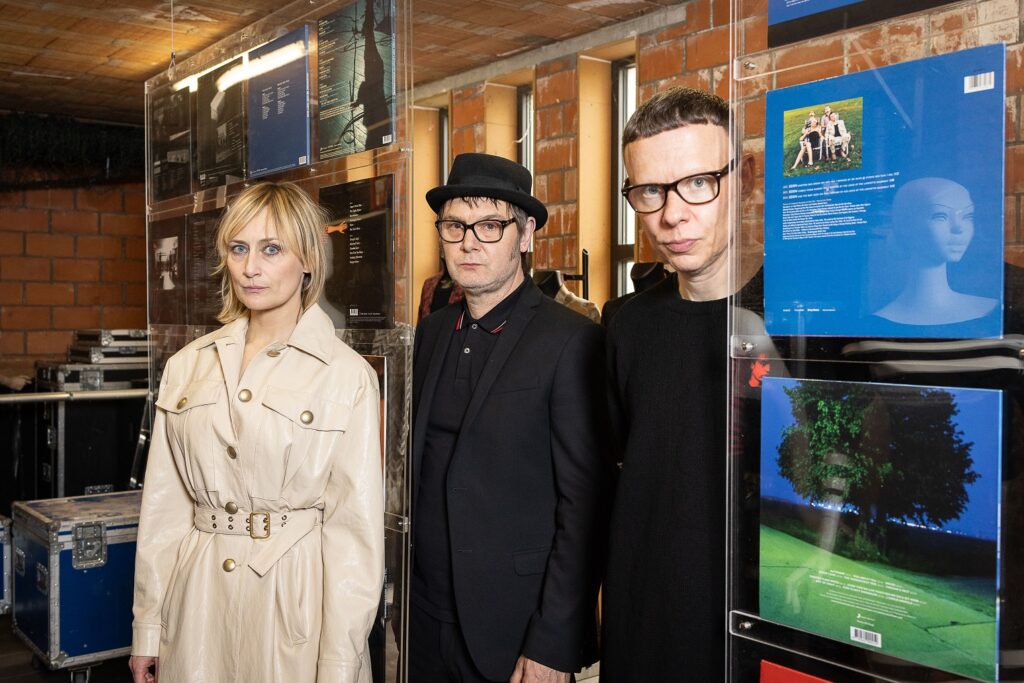
Singer Geike Arnaert, Hooverphonic's Raymond Geerts and Hooverphonic's Alex Callier pictured during the 'Mad About Hooverphonic' expo on Belgian band Hooverphonic, Friday 30 April 2021 in Sint-Niklaas. BELGA PHOTO JAMES ARTHUR GEKIERE
He was recognised a bit more when he was a coach on the Flemish version of The Voice, but even so, most Belgians just tend to ask for a selfie or autograph. “I’m proud that Hooverphonic are world famous, but not that world famous. I'm very happy with our career. We make a decent living. We do whatever we like. We do whatever we want, basically. We’ve got artistic freedom,” he says.
That freedom can have a downside. Former bandmates have suggested Callier is difficult to work with and a perfectionist control freak. He agrees he’s a perfectionist but insists: “I’m very good at knowing when to stop.” Nonetheless, Duchêne walked out after the band’s second album, 1998’s Blue Wonder Power Milk, citing musical differences with Callier.
Arnaert gave the same reason for her exit a decade later – although Callier insists they parted on “amicable terms”. The band auditioned hundreds of potential replacements before selecting her successor, Noémie Wolfs, who made an instant impact with 2010’s Anger Never Dies. “I wrote the song in 2003 but Geike didn't really connect to it. We sped it up into more of a chamber pop record for Noémie, and it worked so we created a whole album [The Night Before] around it,” he adds.
Magnificent Three ride again
Within five years the relationship with Wolfs cooled and she was jettisoned. In a generous Facebook message, she described her tenure as “a fantastic chapter in which I only remember great moments”. After releasing the eclectic, if optimistically titled, In Wonderland, featuring five male and female singers, Callier recruited Kimberly Dhondt as the band’s vocalist. She lasted a year before being succeeded by 17-year-old Luka Cruysberghs, whom Callier coached on The Voice.
Cruysberghs made 2018’s underrated Looking For Stars album with the group and recorded a follow-up but it was canned after Callier decided “it wasn’t working due to inconsistent live performances.” Her father Filip also took to Facebook, where he was far less complimentary about the band than Wolfs. Arnaert, the voice of Hooverphonic’s biggest-selling album, The Magnificent Tree, was welcomed back into the fold in late 2020, with Callier declaring: “The Magnificent Three are together again.”
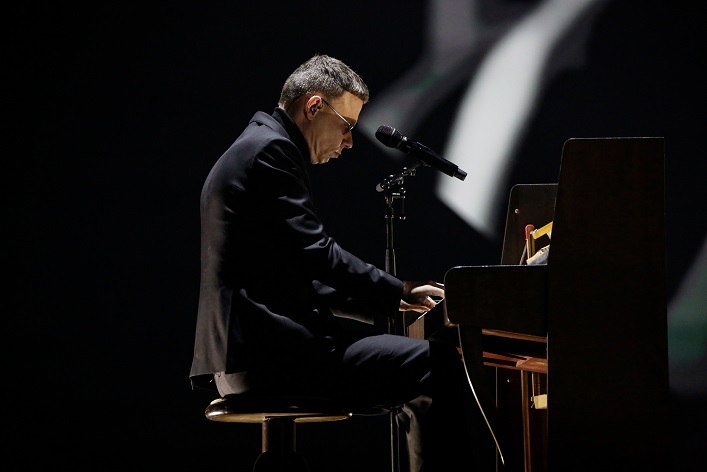
Callier on piano
It’s noticeable, however, that neither Arnaert, 43, nor 63-year-old Raymond Geerts get much of a look-in when it comes to songwriting duties. Has that caused friction?
“They're not really songwriters, but they're always welcome,” Callier says. “Everyone has their talents. I'm a very good songwriter, arranger and producer and Geike is a very good performer and singer. On the new record, I played everything and she sang everything. Raymond is a great live guitar player. If they really want to write, they can come and sit here with me every day.”
Monastic routine
That’s easier said than done given his daily routine, which borders on the monastic. When the band aren’t touring, Callier says he is up at 6:20am on the dot, every weekday. “I have my porridge and tea, say bye to my wife [Greet, a teacher: they’ve been together 11 years and married for six], then go to my gym. I have a bad knee and hip, so I’m working on that. After 30-40 minutes I get dressed and I’m in the studio around 8:30. I work the whole day, with almost no breaks, until 6:30pm. Then I go home, start cooking, have dinner and watch a series.”
He also works in the studio over the weekend, albeit at a slightly lighter pace. “I work practically every day. So, yeah, I'm very disciplined, extremely disciplined,” he adds. Was he always this driven? “Yeah. I used to work even longer hours, but nowadays I have a lot of tinnitus, so I need to be careful.”
He admits that songwriting has always come easy to him, even on the road. “I can sit down and I write a song every day. Of course, that doesn’t mean it will be a hit. Writing a hit is still magic. It just happens.”
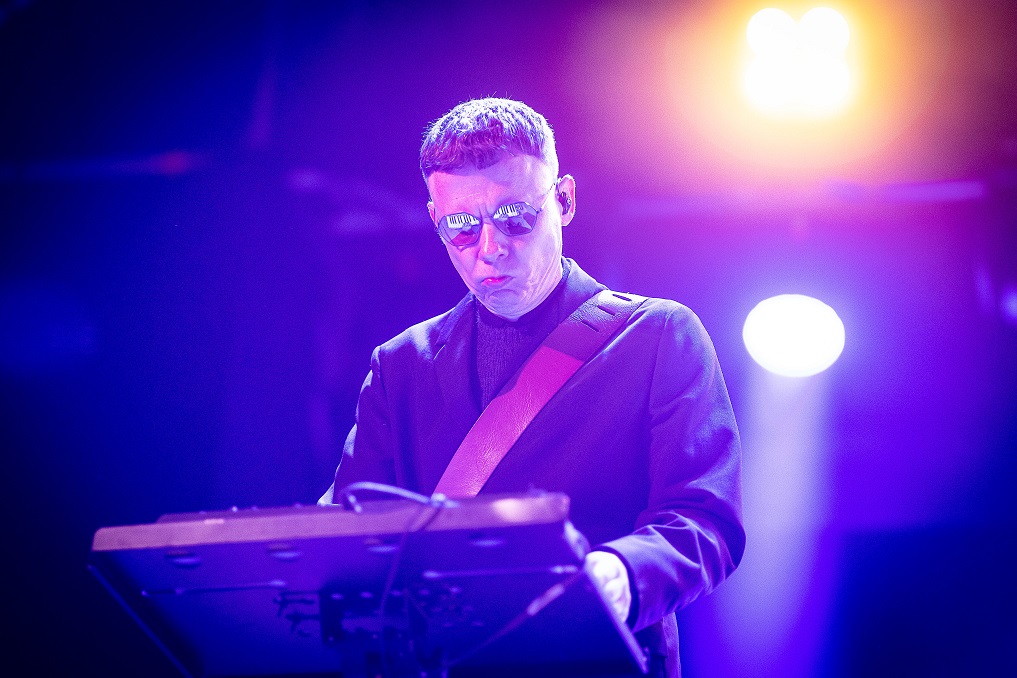
Callier on keyboards
He remains open to working with other writers. In recent years he has collaborated with left-field musicians such as Italian Luca Chiaravalli, with whom he wrote Heartbroken (from The Night Before) and Amalfi (Reflection), Charles (the stage name of fellow Belgian Charlotte Forêt) on The Wrong Place and If You’d Really Know Me (from Hidden Stories) and Irish-English musician Janie Price (Bird), who co-wrote I Like the Way I Dance (In Wonderland) and Circus (Hidden Stories). Price, a multi-instrumentalist, recently invited Callier to a music camp at her home in Florence.
Not that Callier is short of material. He has already recorded far more new songs than he can squeeze onto the new album. Two tracks have a “different feel” to the rest, so he’s thinking of leaving them off it. “They’re good songs, but they're not really right for this record so I’ll probably put them in my song cellar. If I still like them later, I’ll make a record that fits around them. I often do that.”
Callier spends hours tweaking and polishing his songs before Arnaert comes over to his studio to record her vocals from the sofa. “It's all about trying to get the energy right. That's what recording and producing is. I record the demo vocals really, really well. When Geike sings a song for the first time, you can hear that she has a crush on it.”
On the road
Hooverphonic will be back on the road this year to promote the new album. They start in Sint-Niklaas at De Casino, where Callier is known as the godfather of the club with some warm-up shows (April 27-29) before the main tour kicks off with dates including Tunis in May, Prague in June and Istanbul in July. Many shows will be at festivals.
“In the fall, we’ll be touring with a string quartet and we might do some dates with a full orchestra,” he says. “It's been 20 years since we worked with a quartet on our album Sit Down and Listen. It's a great way to play live. We don’t need as many computers running on stage. Plus, with a quartet, we can all get on one tour bus, 10 musicians and four or five crew.”
Does he have a favourite venue? “I like the Cirque Royal in Brussels, but the trouble is that my favourite venue in Belgium is not the Flemish people's favourite! They would rather go to the Ancienne Belgique. But at the Cirque Royal you're surrounded by the audience, you can do it half-standing and half-seated which means it's great for everybody, and it’s acoustically very good.”
Outside Brussels, he cites the Forum in Liège, the Roma in Antwerp and the Handelsbeurs in Ghent, as well as their local club, De Casino.
We listen to some more of the new songs. The feel is retro but at the same time very modern and cinematic: typically Hooverphonic, in other words. At the time of writing, Callier is still discussing which label the album will be released on. He’s worked on the tracks for months on end and must have heard them hundreds of times already but listens avidly.
For a perfectionist, he looks reasonably satisfied. Now, all he has to figure out is the running order.
Sit down and listen: Hooverphonic’s albums rated
- A New Stereophonic Sound Spectacular (1996). Some debut. Includes 2Wicky from the Stealing Beauty soundtrack, which would also feature in US crime drama CSI: Crime Scene Investigation (along with Inhaler). Only album with Liesje Sadonius as vocalist. 4/5
- Blue Wonder Power Milk (1998). The first album with Geike Arnaert. Key tracks include evergreen Eden & Renaissance Affair, which featured in the movie Shades and US commercial for the Volkswagen Beetle. New York producer Mark Plati, known for his work with David Bowie and Fleetwood Mac, left his mark. 4/5
- The Magnificent Tree (2000). The band’s international breakthrough, signalling a more pop-oriented direction. Features Mad About You (dedicated to Callier’s crush, Cathy Dennis), used in US TV series Cold Case and rom-com A Lot Like Love, and the glorious Jackie Cane. Hooverphonic headlined Rock Werchter the following year. 4/5
- Hooverphonic Presents Jackie Cane (2002). Ambitious and very listenable concept album, it tells the story of a singer catapulted into stardom and driven to the brink of insanity before her twin sister kills them both. Standouts include The World Is Mine, featured in UK TV series Mile High, and The Last Thing I Need Is You, written with Cathy Dennis. 3/5
- Sit Down and Listen to Hooverphonic (2003). Live studio album recorded with an orchestra and including tracks from their first four albums. 4/5
- No More Sweet Music/More Sweet Music (2005). Double album, it includes the same 11 tracks but in different versions – none of which are compelling. Lacks a standout. 2/5
- The President of the LSD Golf Club (2007). What Callier calls their psychedelic album divided fans. Geike Arnaert left the band the following year. 2/5
- The Night Before (2010). A return to form, featuring 22-year-old new singer Noémie Wolfs. Opener, Anger Never Dies, and title track are up there with Hooverphonic’s best. 4/5
- With Orchestra Live (2012). Recorded at the Koningin Elisabethzaal in Antwerp, it features orchestral versions of tracks. 3/5
- Reflection (2013). Packed with catchy, melodic numbers, it was recorded in different people's homes. Callier wanted to tone down the strings and give more space to Noémie Wolf's voice. Not their best, but worth a listen. 3/5
- In Wonderland (2016). Callier enlisted five different singers to contribute two songs each. An eclectic, international cast, they are: Émilie Satt (Madame Monsieur), Christa Jérôme (Marc Moulin, Starflam), Tjeerd Bomhof (Dazzled Kid), Janie Price (Bird), Neil Thomas (Litlo Tinz) and Felix Howard. A patchy collection, albeit containing a zinger, Badaboum. 2/5
- Looking for Stars (2018). The only album to feature Luka Cruysberghs, winner of the fifth season of the Flemish version of The Voice. No shortage of catchy songs including Uptight and Romantic. Cruysberghs recorded a follow-up but it was junked when she was asked to leave the band. 3/5
- Hidden Stories (2021). Features the band’s trademark melancholic sound but, despite Geike Arnaert’s return, didn’t quite live up to expectations. Includes the cruelly underrated Eurovision entry The Wrong Place. 3/5

